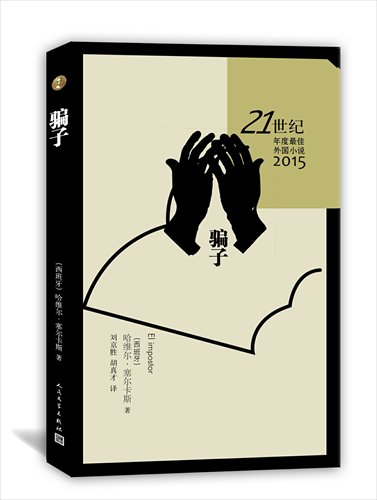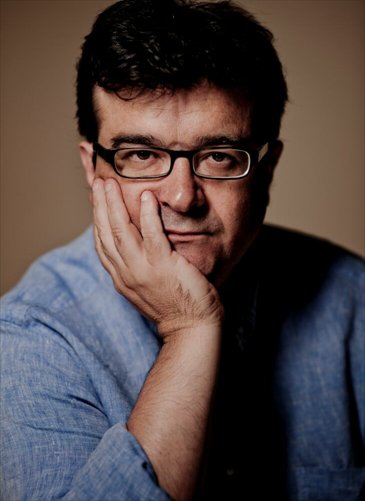Award-winning Spanish novel explores the sustainability of peace

Cover of the Chinese version of El Impostor Photo: Courtesy of Hu Zhencai

Spanish writer Javier Cercas Photo: Courtesy of Hu Zhencai
Novel El Impostor (The Imposter), written by Spanish writer Javier Cercas, won one of China's top honors - The 21st Century Zou Taofen Foreign Novel of the Year - last month for its balanced examination of the true story of Enric Marco, a man whose life was a lie.
Personal circumstance
Having lived through the Spanish Civil War, World War II, Franco's dictatorship and the transition of Spain from dictatorship to democracy, Marco, the focus of the novel, is a complete drama king. Bored with his average life during the 1970s, the 50-year-old makes up stories about when he was young, repackaging himself as a freedom fighter in the war against Franco and a Nazi concentration camp survivor.
In 1990s, Spain begins to reflect on Franco's 30-year-dictatorship. During this movement, Marco begins accepting interviews and giving speeches, putting forward the slogan "Forgive the past, yes we can; but forget the past, never!" He starts to earn a reputation as a hero which allows him to live the high life. However, his lies are eventually exposed in 2005.
In his book, the author takes great care to analyze Marco's behavior, pointing out that many people made themselves over by creating fictional pasts for themselves as Spain started on the road to democracy.
It reminds me of the early 1980s when China "completely negated" the Cultural Revolution (1966-76), many wrongdoers pretty much did exactly as Marco did, whitewashing their pasts by only talking about how they were hurt, yet never mentioning how they hurt others. If all of them were as innocent as they claimed, I don't see how so many tragedies would have happened. Thus, the last sentence to Chinese readers in the Chinese version says: "The real liar is not Eric Marco, but you."
Nationalistic consciousness
When exploring the deeper reasons behind Marco's deception and examining the social circumstances that allowed his lies to grow, Cercas attributes the success of the fraud to a "collective amnesia." He further believes that Spanish democracy is based on a huge lie made up of numerous individual lies.
In his novel, Cercas expresses his sincere appreciation of Spain's successful transition from dictatorship to democracy, which he calls the "legend of silence." With Franco's death in November 1975, Juan Carlos I ascended the throne and instituted reforms. Through a national election in October 1982, a democracy was established that would see the Socialist Workers' Party and People's Party rule in turn.
The smooth transfer of power can be attributed to a contract that requires all political parties to vow to never repeat the mistakes of the 1940s that provoked a civil war. The contract also includes a ban on using past incidents as political weapons today and using today's standards to judge the past. The success in Spain can act as quite a meaningful reference for other countries that are looking to carry out a similar transition.
Appreciation aside, Cercas is sharply critical of current Spanish social realities. For examples, those in power either pay little attention to or outright shun the past, or popularize certain parts of history as a political tool. For a period of time, people became interested in the past, which opened the door to people like Marco who are good at acting and selling themselves. These type of people take advantage of people's desire to remember history, with stories that are empty inside. To emphasize the danger this brings, the book mentions several times that Spain has failed to properly reflect on the past.
Worldwide vision
El Impostor was finished in 2014, coinciding with the 70th anniversary of the end of World War II. In addition to exposing fraud, the novel also questions war and peace, and condemns atrocities carried out by the Nazis.
At the end of the novel, Cercas writes: "For thousands of years, we Europeans have done nothing but fight against each other. But I, yes, I became the first European who grew up without war. Some say war is over and will never happen again, but I don't believe it."
The author's skepticism is understandable. Reviewing the 70-year-history after World War II, wars have never stopped. Struggles and partial conflicts are sprouting up almost every day, not only in Europe but also around the world. This is why this novel that uses the idea of an "imposter" as its main theme has another more meaningful purpose: It reminds people not to forget the past and be prepared for danger even in times of safety.
Unique art form
Nonfiction is a popular creative tool nowadays. According to one Chinese writer, nonfiction is the use of historical truth to restore history. Looking at the impact the reveal that Marco was a fraud had on Spain and even Europe, Cercas decided to adopted a "non-fiction" writing style to tell Marco's story.
To restore Marco's true history, Cercas spent several years investigating and carrying out interviews, including face-to-face talks with Marco. In the book's appendix he has copies of all the photos, papers, letters and news reports that he gathered, evidence that the reader can examine at his or her leisure.
While the book can be considered a nonfiction effort, Cercas has, however, added some fictional elements. He starts one chapter by explaining: "The following dialogue between Marco and I is fictional..."
This fictional dialogue can be thought of as a supplement analysis that further examines the inner-world of the imposter and his exaggerated life.
El Impostor is a novel that lingers between fact and fiction. It blurs the boundaries between the two through the use of exaggerated imagination and realistic details, which opens a new door to a different type of literature writing.
(The author is one of two translators of the Chinese version of the Spanish novel.)
Newspaper headline: ‘El Impostor’